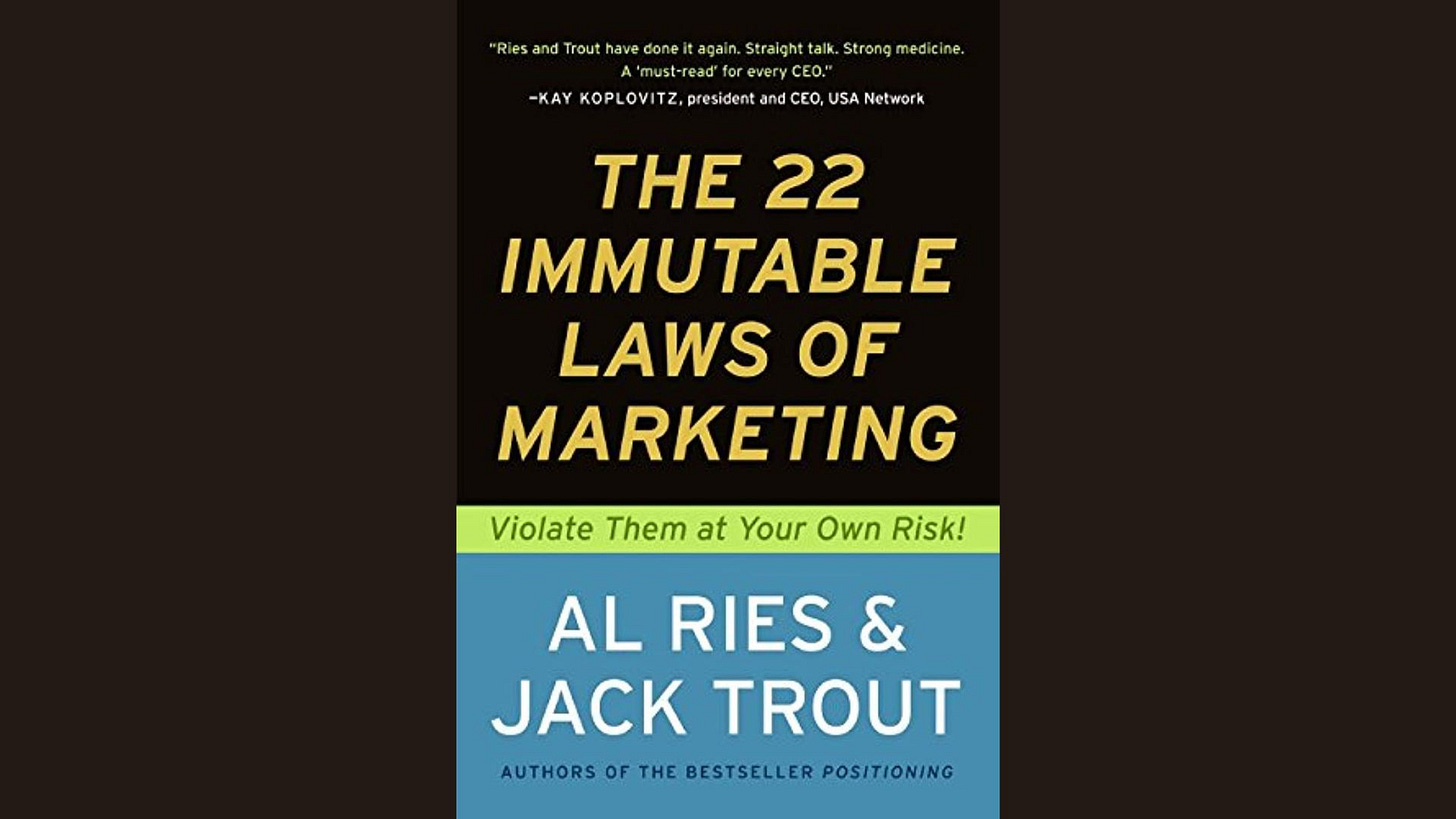Book Byte #295 "The 22 Immutable Laws of Marketing" by Al Ries and Jack Trout
Violate Them at Your Own Risk!
📣 Curious Quotes from the Author
“Marketing is a battle of perceptions, not products.”
“The only reality you can be sure about is in your own perceptions. If the universe exists, it exists inside your own mind and the minds of others.”
“A perception that exists in the mind is often interpreted as a universal truth.”
“The single most wasteful thing you can do in marketing is try to change a mind.”
“With a name like Smucker’s, it has to be good.” Most companies, especially family companies, would never make fun of their own name. Yet the Smucker family did, which is one reason why Smucker’s is the No.1 brand of jams and jellies. If your name is bad, you have two choices: change the name or make fun of it.”
“You want to change something in a computer? Just type over or delete the existing material. You want to change something in a mind? Forget it.”
“You “burn” your way into the mind by narrowing the focus to a single word or concept. It’s the ultimate marketing sacrifice. Federal Express was able to put the word overnight into the minds of its prospects because it sacrificed its product line and focused on overnight package delivery only. In a way, the law of leadership—it’s better to be first than to be better—enables the first brand or company to own a word in the mind of the prospect. But the word the leader owns is so simple that it’s invisible. The leader owns the word that stands for the category. For example, IBM owns computer. This is another way of saying that the brand becomes a generic name for the category. “We need an IBM machine.” Is there any doubt that a computer is being requested? You can also test the validity of a leadership claim by a word association test. If the given words are computer, copier, chocolate bar, and cola, the four most associated words are IBM, Xerox, Hershey’s, and Coke. An astute leader will go one step further to solidify its position. Heinz owns the word ketchup. But Heinz went on to isolate the most important ketchup attribute. “Slowest ketchup in the West” is how the company”
“fad is a wave in the ocean, and a trend is the tide. A fad gets a lot of hype, and a trend gets very little. Like a wave, a fad is very visible, but it goes up and down in a big hurry. Like the tide, a trend is almost invisible, but it’s very powerful over the long term. A fad is a short-term phenomenon that might be profitable, but a fad doesn’t last long enough to do a company much good. Furthermore, a company often tends to gear up as if a fad were a trend. As a result, the company is often stuck with a lot of staff, expensive manufacturing facilities, and distribution networks. (A fashion, on the other hand, is a fad that repeats itself. Examples: short skirts for women and double-breasted suits for men. Halley’s Comet is a fashion because it comes back every 75 years or so.) When the fad disappears, a company often goes into a deep financial shock. What happened to Atari is typical in this respect. And look how Coleco Industries handled the Cabbage Patch Kids. Those homely dolls hit the market in 1983 and started to take off. Coleco’s strategy was to milk the kids for all they were worth. Hundreds of Cabbage Patch novelties flooded the toy stores. Pens, pencils, crayon boxes, games, clothing. Two years later, Coleco racked up sales of $776 million and profits of $83 million. Then the bottom dropped out of the Cabbage Patch Kids. By 1988 Coleco went into Chapter 11. Coleco died, but the kids live on. Acquired by Hasbro in 1989, the Cabbage Patch Kids are now being handled conservatively. Today they’re doing quite well.”
“Elvis Presley’s manager, Colonel Parker, made a deliberate attempt to restrict the number of appearances and records the King made. As a result, every time Elvis appeared, it was an event of enormous impact. (Elvis himself contributed to this strategy by overdosing early and severely dampening his future appearances. Likewise Marilyn Monroe and James Dean.)”
📚 Cognition of the Book’s Big Idea
Understanding the principles that businesses operate by is considerably more crucial than having the money to invest in marketing methods.
Effective marketing focuses on perceptions rather than goods. In order to create a strategy that consistently works, adhere to the laws of marketing.
Until Tomorrow,
Jason (Founder Club255)

